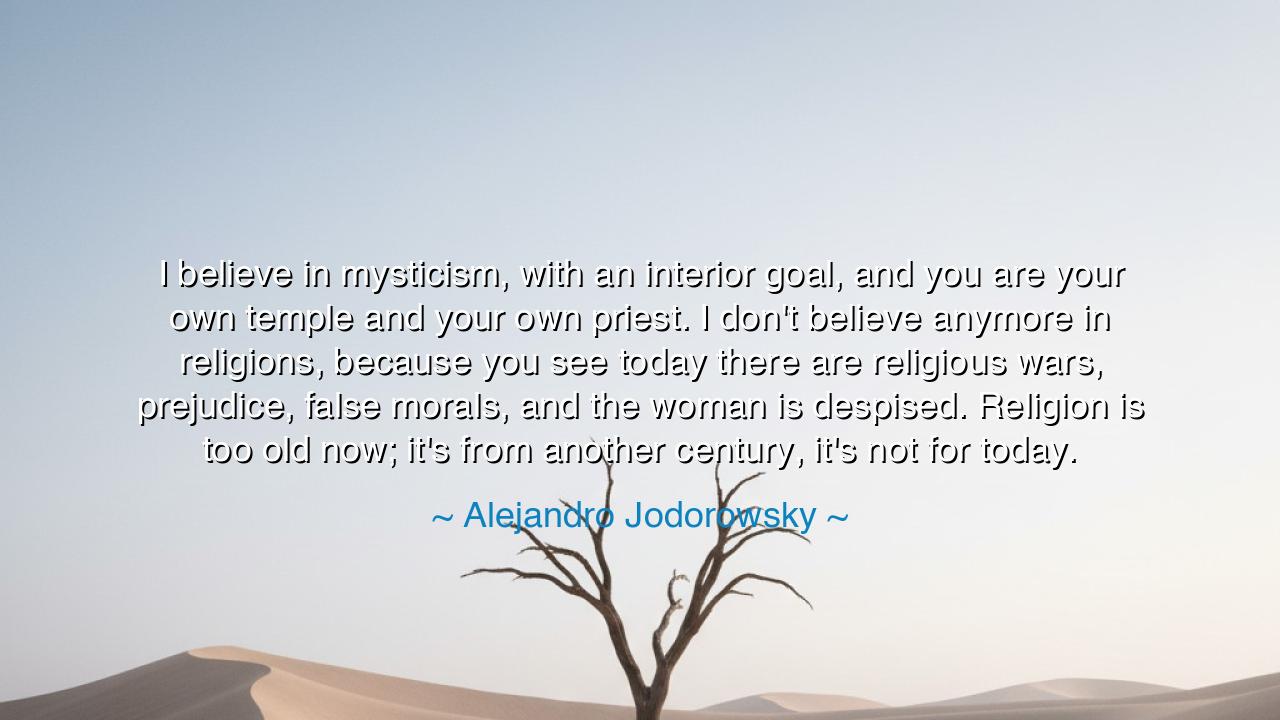
I believe in mysticism, with an interior goal, and you are your
I believe in mysticism, with an interior goal, and you are your own temple and your own priest. I don't believe anymore in religions, because you see today there are religious wars, prejudice, false morals, and the woman is despised. Religion is too old now; it's from another century, it's not for today.






“I believe in mysticism, with an interior goal, and you are your own temple and your own priest. I don’t believe anymore in religions, because you see today there are religious wars, prejudice, false morals, and the woman is despised. Religion is too old now; it’s from another century, it’s not for today.” – Alejandro Jodorowsky
There is a fire in these words — a sacred rebellion against the chains that once bound the spirit of humanity. Alejandro Jodorowsky, a visionary of mind and soul, speaks not to destroy faith, but to awaken it from its long sleep beneath the stone altars of dogma. When he says, “you are your own temple and your own priest,” he calls upon the eternal truth whispered by the mystics of every age: that the divine is not found in towers or temples, but in the depths of one’s own heart. This is the mysticism of inward vision — not the worship of form, but the pursuit of awakening. It is the journey of the soul back to its source, where no intermediary stands between the seeker and the sacred.
In the ancient lands of the East, sages sat beneath the Bodhi tree or in the caves of the Himalayas, seeking the same truth. They did not ask others to believe; they asked themselves to see. Mysticism, in Jodorowsky’s sense, is this turning inward, the courageous act of looking within to find the divine flame that neither time nor tyranny can extinguish. To be “your own priest” is not to reject holiness, but to claim it fully — to become responsible for your own spirit, your own purification, your own enlightenment. The ancients would say that the temple made of stone will one day crumble, but the temple made of awareness will stand forever.
When Jodorowsky speaks of his disbelief in religion, he mourns what once was beautiful but has decayed. There was a time when faith was a bridge between the human and the divine. But as centuries passed, that bridge became a fortress, guarded by fear and ruled by men who forgot that love was the first law. Wars were waged in the name of God, prejudice grew under the banner of purity, and women — the givers of life — were silenced and scorned. The spirit, once free as the wind, was caged by those who claimed to own the key. Thus, he says, religion is too old now, for its robes are heavy with blood and hypocrisy.
Yet even in this lament, there is hope. The mystic does not curse the past; he learns from it. Like the phoenix, faith must burn to be reborn. The temples of the old world may crumble, but from their dust rises a new kind of worship — the worship of consciousness, compassion, and inner truth. Jodorowsky’s words are not a call to abandon the sacred, but to renew it within ourselves. He reminds us that when the world’s altars fall, we must build new ones in the silent cathedral of the soul.
Consider the story of Hypatia of Alexandria, the philosopher and scientist who lived in the twilight of the ancient world. She sought truth through reason and spiritual insight, teaching that wisdom belonged not to any creed but to all humanity. Yet for this, she was destroyed by the fury of religious zealots, torn apart in the name of righteousness. Her death is the tragedy Jodorowsky laments — the moment when religion, instead of guiding, began to devour the light it was meant to protect. But even in her destruction, Hypatia’s spirit lived on, echoing through centuries, whispering to those who dared to think and to feel freely.
The lesson is clear: do not surrender your soul to another’s command. Do not let the voice of tradition drown the song of your own heart. To live as your own temple and your own priest is to honor the divine spark within, to care for it with truth, love, and discipline. Practice silence; listen for the still voice beneath the noise of the world. Meditate not to escape life, but to enter it more fully. Act not out of fear, but from the wisdom that arises when you know yourself as sacred.
So walk the path of the mystic — not the path of rejection, but of remembrance. Bow not to idols of stone, but to the spirit that breathes within all things. Let your compassion be your prayer, your mindfulness your ritual, your courage your offering. For the time of blind obedience has passed; the age of inner awakening has begun. The gods now wait not in temples, but in the silent chambers of the human soul — and when you finally hear them, you will understand what Jodorowsky meant: that you are your own temple, and your own priest, and that within you dwells the eternal.






AAdministratorAdministrator
Welcome, honored guests. Please leave a comment, we will respond soon